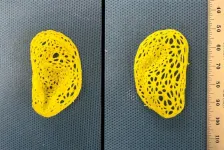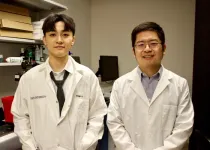(Press-News.org) Waltham — March 29, 2024 — Parents voice strong concerns about social media sharing of images of children undergoing craniofacial surgery, reports a survey study in the April issue of Plastic and Reconstructive Surgery®, the official medical journal of the American Society of Plastic Surgeons (ASPS). The journal is published in the Lippincott portfolio by Wolters Kluwer.
"Pediatric plastic surgeons must understand that consent and assent are necessary before posting patient images online," comments senior author Kenneth L. Fan, MD, of Georgetown University Hospital. "Based on our findings, we recommend seeking consent from not only the parents but also the children themselves, at ages as young as nine years."
The study was performed in partnership by researchers from Georgetown and University of Michigan. Dr. Fan's coauthors were Samuel S. Huffman, BS, Peter T. Hetzler III, MD, MHS, Steven B. Baker, MD, DDS, and Christian J. Vercler, MD.
Study explores parental perceptions of posting children's photos online
Social media use has become widespread in plastic surgery, raising potential ethical and professional concerns. Sharing patient images can play a valuable role in information and education for plastic surgeons and other healthcare professionals, as well as patients and families.
Posting images of children with craniofacial deformities poses unique ethical challenges because they show the head and face, by definition they make the child potentially identifiable. While patients always have the right to revoke permission to share images or other personal information, images posted on social media leave a "permanent online footprint."
The researchers designed an online survey exploring parents' perceptions of social media use by pediatric plastic surgeons. The anonymous survey included examples of full-face pictures of children, ranging from infants to preteens, who underwent craniofacial surgery. All images had been publicly posted by surgeons on popular social media platforms.
Survey questions highlighted the consent/assent process and professional issues raised by social media posting. Of 656 responding parents, six percent had a child who had been operated on by a plastic surgeon. Parents overwhelmingly believed that surgeons need to obtain consent before posting pictures of children on social media. About 90% of respondents indicated that surgeons must obtain consent from parents before sharing images, regardless of the child's age.
Social media sharing should 'focus on the vulnerability of the patient'
Respondents also believed that surgeons should seek consent from the children themselves before sharing images. The average age at which parents thought surgeons needed to obtain the child's consent was 9.65 years. Nearly half of parents felt that surgeons need to document assent for younger children and even for infants – "even if only to say the child is not old enough for proper assent," the researchers write.
Parents who followed plastic surgeons on social media were more likely to believe that surgeons need to document assent from all pediatric patients. Forty percent of parents felt that children portrayed in pictures on social media were being exploited, regardless of age. This view was more common among parents with higher levels of education.
"Our study suggests that a strong majority of parents believe that surgeons should obtain written consent from parents before posting pictures of pediatric patients on social media," Dr. Fan and colleagues write. They note that this finding is consistent with the ASPS Code of Ethics social media policy, which can be found here.
Dr. Fan and coauthors conclude: "The use of social media by craniofacial plastic surgeons has the promise to positively affect the field, but it must be done professionally and ethically with an intentional focus on the vulnerability of the patient."
[ Read Article: "Parents’ Perceptions of Social Media Use by Pediatric Plastic Surgeons" ]
Wolters Kluwer provides trusted clinical technology and evidence-based solutions that engage clinicians, patients, researchers and students in effective decision-making and outcomes across healthcare. We support clinical effectiveness, learning and research, clinical surveillance and compliance, as well as data solutions. For more information about our solutions, visit https://www.wolterskluwer.com/en/health.
###
About Wolters Kluwer
Wolters Kluwer (EURONEXT: WKL) is a global leader in information, software solutions and services for professionals in healthcare; tax and accounting; financial and corporate compliance; legal and regulatory; corporate performance and ESG. We help our customers make critical decisions every day by providing expert solutions that combine deep domain knowledge with technology and services.
Wolters Kluwer reported 2023 annual revenues of €5.6 billion. The group serves customers in over 180 countries, maintains operations in over 40 countries, and employs approximately 21,400 people worldwide. The company is headquartered in Alphen aan den Rijn, the Netherlands.
For more information, visit www.wolterskluwer.com, follow us on LinkedIn, Facebook, YouTube and Instagram.
END
Social media images of pediatric craniofacial patients – parents voice concerns
Surgeons should seek consent from children as young as nine years, suggests survey in Plastic and Reconstructive Surgery®
2024-03-29
ELSE PRESS RELEASES FROM THIS DATE:
Researchers produce grafts that replicate the human ear
2024-03-29
Researchers Produce Grafts that Replicate the Human Ear
Using state-of-the-art tissue engineering techniques and a 3D printer, researchers at Weill Cornell Medicine and Cornell Engineering have assembled a replica of an adult human ear that looks and feels natural. The study, published online in Acta Biomaterialia on March 16, offers the promise of grafts with well-defined anatomy and the correct biomechanical properties for those who are born with a congenital malformation or who lose an ear later in life.
“Ear reconstruction requires multiple surgeries and an incredible amount of artistry ...
Hevolution Foundation issues $115 million call for applications for geroscience research opportunities
2024-03-29
BOSTON, United States — 29 March, 2024 — Based on the success of its 2023 HF-GRO program effort, Hevolution Foundation is issuing a call for applications for the 2024 iteration of the program. HF-GRO is an international effort to accelerate progress in healthy aging research. The major goal is to identify and support research that will further the Hevolution’s mission of extending healthy lifespan for the benefit of all humanity.
HF-GRO will ...
Rice study identifies protein responsible for gas vesicle clustering in bacteria
2024-03-29
HOUSTON – (March 29, 2024) – Gas vesicles are hollow structures made of protein found in the cells of certain microorganisms, and researchers at Rice University believe they can be programmed for use in biomedical applications.
“Inside cells, gas vesicles are packed in a beautiful honeycomb pattern. How this pattern is formed has never been thoroughly understood. We are presenting the first identification of a protein that can regulate this patterning, and we believe this will be a milestone in molecular microbiology,” said George Lu, assistant professor of bioengineering and a Cancer Prevention and Research Institute of Texas scholar.
Lu and colleagues have published ...
AADOCR announces recipients of the 2024 Student Competition for Advancing Dental Research Application (SCADA)
2024-03-29
Alexandria, VA – The American Association for Dental, Oral, and Craniofacial Research (AADOCR) has named the recipients of the 2024 Student Competition for Advancing Dental Research Application (SCADA). The recipients were recognized during the Opening Ceremonies of the 53rd Annual Meeting of the AADOCR, which was held in conjunction with the 102nd General Session of the International Association for Dental, Oral, and Craniofacial Research and the 48th Annual Meeting of the Canadian Association for Dental Research, on March 13-16, 2024 in New Orleans, LA.
The winners are:
CLINICAL RESEARCH & PUBLIC HEALTH CATEGORY
1st ...
Veterans help provide greater insight into Klinefelter and Jacobs syndromes
2024-03-29
AURORA, Colo. (March 29, 2024) –Researchers at the University of Colorado Anschutz Medical Campus and collaborators across the country have conducted the largest and most diverse study of men with extra X or Y chromosomes in the US using a large dataset of military veterans. The results could lead to better diagnoses of these underrecognized conditions and earlier treatment of associated diseases.
The study was published today in JAMA Network Open.
“One in 400 males have an additional X or Y chromosome, however 86 percent of these individuals are not diagnosed,” said ...
Three renowned Argonne scientists accept joint appointments at the University of Houston
2024-03-29
HOUSTON, March 29, 2024 – Three top researchers with the U.S. Department of Energy’s Argonne National Laboratory have accepted joint appointments in various capacities at the University of Houston. These appointments are part of the memorandum of understanding (MoU) Argonne signed recently with the Greater Houston Partnership. The MoU creates greater collaboration across academia, industry, private investors and government to accelerate and scale decarbonization efforts in the region, with the goal of achieving a net-zero emissions economy by 2050, according to an Argonne press release.
“This strategic collaboration leverages the combined strengths ...
High-resolution images reveal similarities in protein structures between Alzheimer’s disease and Down syndrome
2024-03-29
INDIANAPOLIS – More than 90% of people with Down syndrome, the most common chromosomal disorder in humans and the most frequent genetic cause of intellectual disability, are diagnosed with Alzheimer’s disease by ages 55-60. A new study recently published in Nature Structural and Molecular Biology uses leading-edge cryo-electron microscopy imaging technology to determine whether differences exist between the protein structures in those with Alzheimer’s disease and those with both Alzheimer’s disease and Down syndrome.
“Just like in Alzheimer’s disease, the neuropathological phenotype in those with ...
How blocking a neural receptor responsible for addiction could reduce alcohol use
2024-03-29
LA JOLLA, CA—Scripps Research scientists have found that LY2444296—a compound that selectively blocks the kappa opioid receptor (KOP)—may reduce drinking in cases of alcohol dependence in animal studies. The findings, which were published March 9, 2024, in Scientific Reports, could eventually inform new treatment options for people who experience alcohol use disorder (AUD).
“Compounds designed to selectively block the KOP are very promising because this receptor is involved in a lot of mental illnesses, such as ...
Researchers discover skin biomarkers in infants that predict early development of food allergies
2024-03-29
DENVER — (MARCH 29, 2024) Food allergies occur often in childhood and can be severe or even fatal. Researchers at National Jewish Health are working to develop a program to prevent food allergies and have now identified early predictors of the condition.
During a recent study just published online in the March 2024 issue of the Journal of Allergy & Clinical Immunology, skin tape strips were collected from the forearms of newborns at the age of two months, an age before there ...
Researchers reveal evolutionary path of important proteins
2024-03-29
New research from the University of Wisconsin–Madison decodes the evolutionary pathway of regulatory proteins, the molecules that help control gene expression.
The findings from the Raman Lab in the Department of Biochemistry recently published their findings in the journal Cell Systems. Here’s a rundown on what they discovered:
Proteins acquire and lose functions through evolutionary processes as cells adapt to changes in their environment over time.
Protein evolution is well studied in certain enzymes but is understudied in regulatory proteins, which help control gene expression.
A new, ...
LAST 30 PRESS RELEASES:
Scientists discover why we know when to stop scratching an itch
A hidden reason inner ear cells die – and what it means for preventing hearing loss
Researchers discover how tuberculosis bacteria use a “stealth” mechanism to evade the immune system
New microscopy technique lets scientists see cells in unprecedented detail and color
Sometimes less is more: Scientists rethink how to pack medicine into tiny delivery capsules
Scientists build low-cost microscope to study living cells in zero gravity
The Biophysical Journal names Denis V. Titov the 2025 Paper of the Year-Early Career Investigator awardee
Scientists show how your body senses cold—and why menthol feels cool
Scientists deliver new molecule for getting DNA into cells
Study reveals insights about brain regions linked to OCD, informing potential treatments
Does ocean saltiness influence El Niño?
2026 Young Investigators: ONR celebrates new talent tackling warfighter challenges
Genetics help explain who gets the ‘telltale tingle’ from music, art and literature
Many Americans misunderstand medical aid in dying laws
Researchers publish landmark infectious disease study in ‘Science’
New NSF award supports innovative role-playing game approach to strengthening research security in academia
Kumar named to ACMA Emerging Leaders Program for 2026
AI language models could transform aquatic environmental risk assessment
New isotope tools reveal hidden pathways reshaping the global nitrogen cycle
Study reveals how antibiotic structure controls removal from water using biochar
Why chronic pain lasts longer in women: Immune cells offer clues
Toxic exposure creates epigenetic disease risk over 20 generations
More time spent on social media linked to steroid use intentions among boys and men
New study suggests a “kick it while it’s down” approach to cancer treatment could improve cure rates
Milken Institute, Ann Theodore Foundation launch new grant to support clinical trial for potential sarcoidosis treatment
New strategies boost effectiveness of CAR-NK therapy against cancer
Study: Adolescent cannabis use linked to doubling risk of psychotic and bipolar disorders
Invisible harms: drug-related deaths spike after hurricanes and tropical storms
Adolescent cannabis use and risk of psychotic, bipolar, depressive, and anxiety disorders
Anxiety, depression, and care barriers in adults with intellectual and developmental disabilities
[Press-News.org] Social media images of pediatric craniofacial patients – parents voice concernsSurgeons should seek consent from children as young as nine years, suggests survey in Plastic and Reconstructive Surgery®




